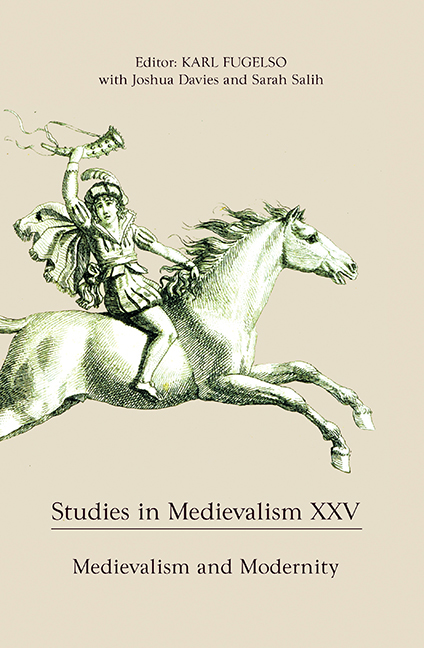Book contents
- Frontmatter
- Studies in Medievalism
- Acknowledgments
- Contents
- List of Illustrations
- Volume XXV 2016
- Editorial Note Karl Fugelso
- I Medievalism and Modernity: Some Perspective(s)
- II Medievalist Visions
- Introduction
- In/visible Medieval/isms
- Art, Heritage Industries, and the Legacy of William Morris in Michel Houellebecq's The Map and the Territory
- Travel in Space, Travel in Time: Michael Morrow's Approach to Performing Medieval Music in the 1960s
- Imagining Medieval Chester: Practice-based Medievalism, Scholarship, and Creativity
- The Anachronic Middle Ages: Public Art, Cultural Memory, and the Medievalist Imagination
- Medievalisms of Moral Panic: Borrowing the Past to Frame Fear in the Present
- Extra-Temporal Place Attachment and Adaptive Reuse: The Afterlives of Medieval English Anchorholds
- Here Be Dragons: Mapping Space and Time, Medieval and Modern
- Contributors
- Miscellaneous Endmatter
Medievalisms of Moral Panic: Borrowing the Past to Frame Fear in the Present
from II - Medievalist Visions
Published online by Cambridge University Press: 05 July 2016
- Frontmatter
- Studies in Medievalism
- Acknowledgments
- Contents
- List of Illustrations
- Volume XXV 2016
- Editorial Note Karl Fugelso
- I Medievalism and Modernity: Some Perspective(s)
- II Medievalist Visions
- Introduction
- In/visible Medieval/isms
- Art, Heritage Industries, and the Legacy of William Morris in Michel Houellebecq's The Map and the Territory
- Travel in Space, Travel in Time: Michael Morrow's Approach to Performing Medieval Music in the 1960s
- Imagining Medieval Chester: Practice-based Medievalism, Scholarship, and Creativity
- The Anachronic Middle Ages: Public Art, Cultural Memory, and the Medievalist Imagination
- Medievalisms of Moral Panic: Borrowing the Past to Frame Fear in the Present
- Extra-Temporal Place Attachment and Adaptive Reuse: The Afterlives of Medieval English Anchorholds
- Here Be Dragons: Mapping Space and Time, Medieval and Modern
- Contributors
- Miscellaneous Endmatter
Summary
This essay argues that understanding both the process by which medievalist tropes feature in the formation of moral panics and the manner in which medievalists are drawn into the debate reveals much about the imagination of the medieval in the shaping of the modern, and also some salient points relating to the role of scholars in public discourse. It would be glib and unhelpful to promote the message that medievalists are making moral-panic medievalisms worse, nor would it be true. The power to analyze and critique the circumstances by which medievalisms become intertwined with the symbolism of moral-panic phenomena is valuable indeed. Nor is any scholarly call for historical accuracy ever in vain.
Academic contributions to the debate serve to encourage greater recognition of the essential normality and humanity of many seemingly alien behaviors. Just as there is a struggle to recognize the inherent sociocultural inequalities that fuel displays of social unrest in the present, so too must we struggle to promote a message that medieval peoples are not wholly alien, irrational, or Other – although different and often confrontational – and cannot be unscrupulously bent to twenty-firstcentury ends.
We live in a time in which unprecedented globalization, cultural change, and fluidity of ideas have created much anxiety and uncertainty about the present and the future. In the face of new fears, it is common to shape discourse by reaching into the past for sense-making tropes and idioms. It is within this context that culturally specific and complex moral panics take place. These panics require fuel, and the queerly atemporal imagined Middle Ages has repeatedly been added to the fire. The results are often erratic and internally inconsistent: as Tison Pugh and Angela Jane Weisl have argued, “medievalism in political discourse fluctuates in its effects, and contemporary medievalisms in politics exemplify these disjointed strategies.” A particularly complex and politically germane manifestation occurs when a phenomenon that I will term “moral-panic medievalism” appears.
In his seminal monograph Folk Devils and Moral Panics, Stanley Cohen defines the moral panic as “a condition, episode, person or group of persons [who] become defined as a threat to societal values and interests.”
- Type
- Chapter
- Information
- Studies in Medievalism XXVMedievalism and Modernity, pp. 157 - 172Publisher: Boydell & BrewerPrint publication year: 2016



